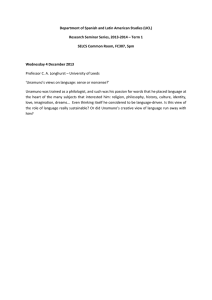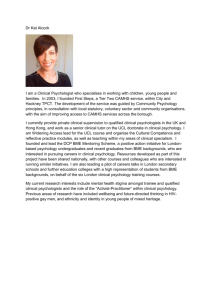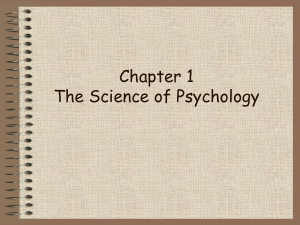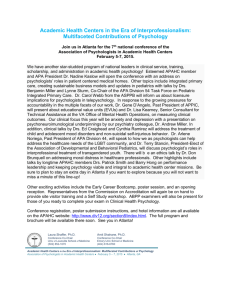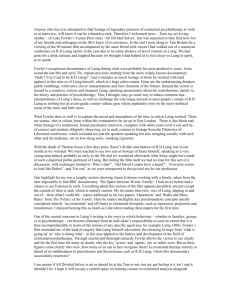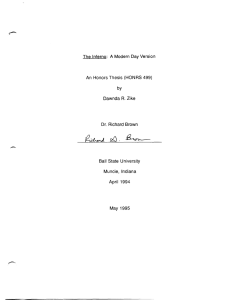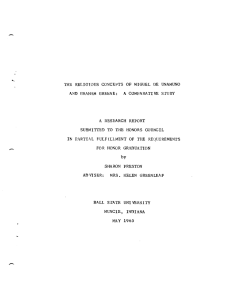Clinical Psychology and Truth
advertisement
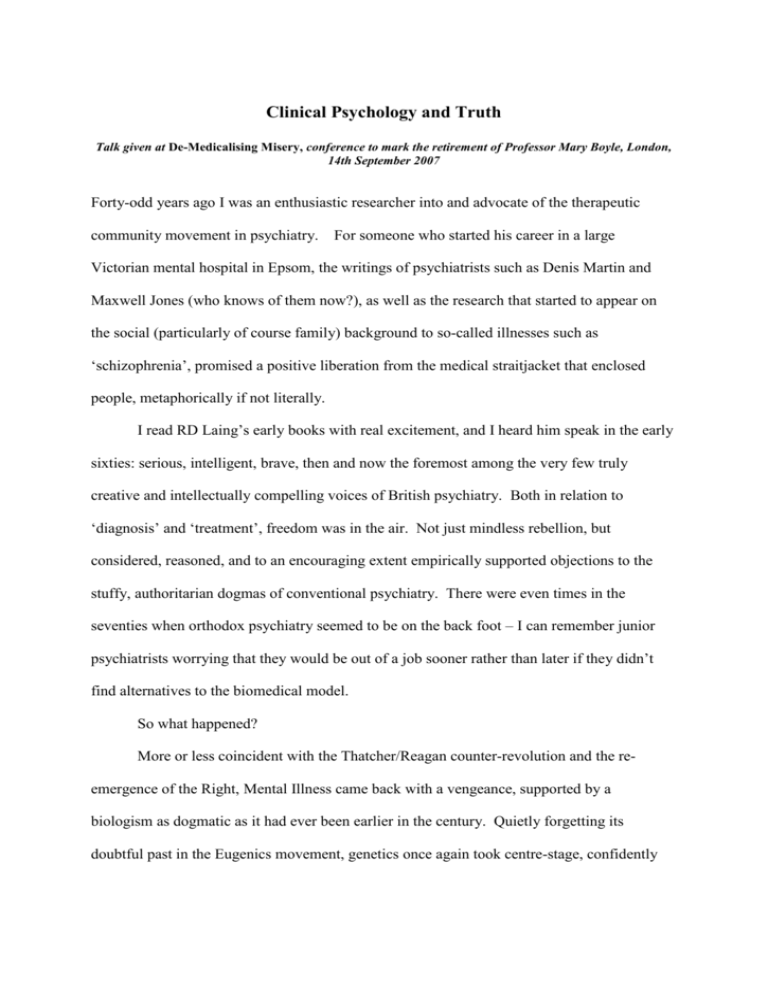
Clinical Psychology and Truth Talk given at De-Medicalising Misery, conference to mark the retirement of Professor Mary Boyle, London, 14th September 2007 Forty-odd years ago I was an enthusiastic researcher into and advocate of the therapeutic community movement in psychiatry. For someone who started his career in a large Victorian mental hospital in Epsom, the writings of psychiatrists such as Denis Martin and Maxwell Jones (who knows of them now?), as well as the research that started to appear on the social (particularly of course family) background to so-called illnesses such as ‘schizophrenia’, promised a positive liberation from the medical straitjacket that enclosed people, metaphorically if not literally. I read RD Laing’s early books with real excitement, and I heard him speak in the early sixties: serious, intelligent, brave, then and now the foremost among the very few truly creative and intellectually compelling voices of British psychiatry. Both in relation to ‘diagnosis’ and ‘treatment’, freedom was in the air. Not just mindless rebellion, but considered, reasoned, and to an encouraging extent empirically supported objections to the stuffy, authoritarian dogmas of conventional psychiatry. There were even times in the seventies when orthodox psychiatry seemed to be on the back foot – I can remember junior psychiatrists worrying that they would be out of a job sooner rather than later if they didn’t find alternatives to the biomedical model. So what happened? More or less coincident with the Thatcher/Reagan counter-revolution and the reemergence of the Right, Mental Illness came back with a vengeance, supported by a biologism as dogmatic as it had ever been earlier in the century. Quietly forgetting its doubtful past in the Eugenics movement, genetics once again took centre-stage, confidently claiming the support of new technology. Laing’s perspective was dismissed on the basis of his later descent into celebrity and alcoholism, and, with one or two somewhat tepid exceptions, research into the social background of madness was abandoned for fear of ‘blaming’ parents. In order to support psychiatric pretensions, and no doubt cognisant of the requirements of the pharmaceutical industry, that farcical instrument the Diagnostic and Statistical Manual of Mental Disorders was developed in a series of editions each more bizarre than the last. I can’t speak for the physical sciences and the technologies they engender – presumably we all have an interest in their flourishing, and hence, to some extent at least, leave them to get on with it – but in the social sciences and indeed the rest of the culture, empirically based critical reason – what one takes to be the very basis of science – all but disappeared in the last quarter of the twentieth century. Indeed, words like ‘empirical’ and ‘reason’ came under attack at the highest intellectual levels. Magic and make-believe re-emerge as respectable methods of structuring social relations. Fundamentalist religions enjoy a surprising revival and political reality comes to be determined by spin. ‘Complementary’ medicine establishes its place in the NHS with Royal endorsement. In psychology, the constraining rule of positivist behaviourism is replaced seemingly overnight by a kind of neo-philosophical-idealism (fitted loosely under the umbrella of ‘postmodernism’) that warrants a comfortable relativism. Cognitions and discourses replace empirical reality and Psychoanalysis is raised from the almost-dead to take its place alongside a range of therapeutic brands from which the consumer can make an uncritical choice. All these events are of course not unrelated. Following an irksome banishment to the wings after two devastating World Wars, the triumphant re-establishment of capitalist economic structures and institutions reverberates throughout the world and penetrates just 2 about every aspect of social relations. For all we therapist clinicians waffle about ‘change’, it is practical women and men of the world who, like Margaret Thatcher, really know how to bring it about. Offer a few juicy carrots and you will bring the worst out of the greedy and ambitious; wave a big, menacing stick (like threatening their livelihoods) and you will have just about everyone else jumping smartly into line. Did heads of NHS departments refuse to implement the new Business strategies that made a mockery of all they stood for? No, they queued up to become Managers. Did the University vice-chancellors and pro-vice-chancellors defend academic freedom and independence; did they speak out for ‘Reason and Right’ as, in the face of fascist oppression years before, had Miguel de Unamuno, the Rector of Salamanca Universityi? No, they formed committees to decide how to institute redundancies, cut courses and sell their degrees abroad. Did ordinary men and women rise up against the economic and disciplinary practices that threatened their jobs, undermined their solidarity and stole their pensions? No, they blamed themselves and looked for a therapist. The Business ideology that corporate capitalism gives rise to has no use for the pursuit of truth; it consists rather of a crude pragmatism: what’s right and good is what works (‘what works’ in this context usually of course meaning ‘what makes money’). This ideology has become so embedded in the culture now that it’s become difficult to think outside it, even for those who want to. Psychological therapists, for example, often find it quite hard to entertain the idea that a given approach or technique could be wrong – misleading, mistaken, nonsensical even – if it ‘works’, in the sense, perhaps, of changing people in some way. But changing and controlling people is easy. You can do it all sorts of ways: put a gun in their backs, doctor the water supply, put them out of a job, stupefy them with consumerist junk and celebrity claptrap, and so on. The Business mind is an uncomplicated one, impatient with the 3 kind of critical cavilling it sees as typical of intellectuals and dismissive of the social structures and institutions that had evolved (however imperfectly) to nurture the pursuit of truth. What we need, according to the Business view, is not to find the truth, but to achieve targets and solve problems. Boil things down to their essentials; establish appropriate divisions of labour such that what anyone does accords with management aims; isolate the active ingredients of intellectual and professional enquiry; establish the ‘evidence base’; amalgamate and homogenize knowledge so that its essence can be extracted (as with ‘metaanalyses’) and put to work towards achievement of the targets or solution of the problems. This kind of mechanized approach to problem solution has nothing to do with trying to discover the reasons for things. Its justification usually is the maximization of profit. A good test of whether something works is whether it pays off. Whether or not it’s true is not just uninteresting, it’s irrelevant. If enough people say they feel better after six sessions of ‘cognitive re-structuring’, that’s good enough; who cares whether ‘cognitive re-structuring’ makes any sense at all as an hypothetical entity? Reason has no place in this debased form of neo-pragmatism, and applied social disciplines such as psychology become entirely detached from the passionate need to locate our place within the world and explicate our relations to it which characterizes scientific enquiry. Indeed, we find philosophies flourishing in which there is no reality independent of ourselves: if we cock an ear to the universe we hear only our own discourse. Scientific enquiry, the search for truth, can best – perhaps only – be carried out in an unusually protected environment where, in return for their concentrated effort, practitioners are accorded a kind of social patronage with as few strings attached as possible. Curiosity, creativity, intellectual ingenuity need to be given absolutely free play. And always and again 4 the notions scientists may have about the world need to be tested against the stubborn reality that can gainsay them. There are all sorts – perhaps an infinity - of ways of doing this, and all attempts to define ‘the scientific method’ and tie scientists down to conforming to it, are likely to fail. But the ultimate criterion is always the same: is the hypothesis supported despite our best attempts to disprove it? Does it tell us something about the nature of the world beyond our own imaginings? Scientific enquiry can only flourish if scientists are trusted to get on with it. Trust can of course be misplaced – the occasional rogue scientist may fabricate results, or perhaps just spend the day doing crosswords and sipping gin-and-tonic (I have personally encountered both kinds). That’s just too bad. But one thing that’s sure to kill off scientific enquiry altogether is the determination to control it managerially, to specify its outcomes and mechanize its procedures. In this kind of situation untrammelled curiosity gives way to a very different kind of interest, and all the scientist’s ingenuity goes into producing the kinds of results desired by those who control the budget. The requirement to disprove gives way to the need to prove; doubts, for example, about the viability of schizophrenia as a disease entity are replaced by claims of its being ‘incontrovertibly’ a genetic disorder (and of course no proposition said to be incontrovertible can ever be a scientific one). Instead of a scientific community collaborating openly and debating critically on publicly available data, there emerge authorities who pronounce on what can and cannot be considered to be the case; committees will be set up to ensure that only authorized ideas and procedures can be entertained, taught, and accredited. And what is authorized will be those ideas and procedures which further the interests of the controlling powers. It is precisely in this way that the critical interrogation of received ideas in the field of mental health gave way to, for example, the kind of assembly-line travesty of research results that NICE supplies for 5 management to set its targets. In view of the occasion we’re at today, I hope it will not be inappropriate for me to say a few words specifically about clinical psychology. There was a time when clinical psychology claimed to be scientific. As is the case with so many social phenomena, this claim was, in my view anyway, shaped by the interest of a particular group – in this case of course clinical psychologists - in finding a role that would distinguish them from the competition – in this case of course psychiatrists, who had a total monopoly in the mental health sphere. This claim to being scientific, however, did mean that, when they were not skivvying for psychiatrists, many clinical psychologists could pursue more or less unhampered a research interest in various aspects of the causes, diagnosis and treatment of what was then thought of as mental illness. They could observe, read, and think critically, and test their observations and hypotheses, for the most part without undue interference from anyone higher up the hierarchy of power. Secretly, though, this wasn’t what most clinical psychologists really wanted to do. Being nice, well-meaning people who had probably drifted into the NHS mainly out of a desire to help people, what they really wanted to do was treatment, and since they had no medical qualifications, their best hope of getting involved in treatment was to find a way of making people better by talking to them. Since Freud had already thought of this, some clinical psychologists duly flirted with or became peripherally attached to psychodynamic approaches of one kind or another, but most leaped at the lifeline offered by the early proselytizers of behaviour therapy such as Hans Eysenck and Joseph Wolpe: here, it seemed, was a treatment approach that not only did not require medical qualifications, but was ‘scientific’ to boot! Of course, behaviour therapy wasn’t scientific at all. Rather as CBT does now, it 6 claimed the authority of science by expressing its dogmas in what sounded like the discourse of scientific method, and then used that authority to browbeat doubters into silence. But most of us were probably happy enough to go along with the new behavioural dispensation anyway, since having our professional interests furthered was on the whole a lot more satisfying than having our doubts assuaged. And so, with only a very little hesitation, we set ourselves on a course from which we have never looked back. We became, so to speak, professional healers, rapidly adopting whatever therapeutic rhetoric seemed most likely to convince our clients and our colleagues in the mental health field. Once the scientism of behaviour therapy became too obviously transparent to support a whole profession, we experimented with a range of therapies that chimed better with the times: person centred therapy, personal construct therapy, rational emotive therapy, Gestalt therapy, and so on. Most of these had the advantage of having been invented by psychologists, and some, at least at their inception, were backed by a healthily respectable body of research. All too soon, of course, these became little more than a mishmash of competing brands, but from them we eventually distilled Cognitive Behavioural Therapy. Even if theoretically self-contradictory, CBT proved to be an ideal combination of behaviourism and cognitivism, and could claim a hopefully impressive scientific pedigree as well as reflecting precisely the popular psychological belief in the individual’s freedom to choose – in this case to choose a rational belief system from which will follow a serene and ordered life. There is no doubt that this headlong rush into becoming, essentially, professional therapists did us a lot of good from the purely material aspect of money and status. Clinical psychologists can even become the heroes of TV dramas and documentaries – a sure sign that we have insinuated our way into public awareness in a way that would have been 7 unimaginable forty years ago. It has also brought the mesmerizing prospect that, if Lord Layard’s fantasies are realized, we could become the backbone of a national drive to rid the populace of debilitating and economically unproductive psychological misery. But these achievements have, I think, been bought at a cost – or rather two costs, though they are related. The first of these is that our scientific role has become paper-thin, almost a figment, existing only as the rigid precepts of what one might call neo-Scientific Management or buried within various so-called ‘postmodernist’ devices relieving us of the need to take seriously the possibility that there is a real world out there. In place of science, we have constructed a kind of theology of method. The second, related cost is that it has become impossible for many, particularly perhaps younger, clinical psychologists to envisage a role for themselves which would not directly involve making people better. Sooner or later, I fear, it will become all too apparent that there is no basis other than self-interest and make-believe for what many of us are supposed to do, just as it will become apparent that it is, indeed, not in our power to make people better. But all is not yet lost. Although CBT threatens to become clinical psychology’s defining paradigm, there are still very significant areas of clinical psychological work where its inadequacies are obvious. In situations where people’s ability to spin themselves an alternative narrative to disguise their reality is limited, or where the effects of their material circumstances become too obvious to ignore, psychologists (and of course others) are forced to turn their attention to trying to modify the person’s world rather than the person’s cognitions. This kind of situation is encountered more often in work with people suffering handicaps of body, mind and age (young as well as old) than it is with the kinds of adult 8 mental health problems that tend to have the highest profile in our work. This kind of experience reminds us that there is indeed such a thing as society, and suggests, I think, an alternative to the cognitive-behavioural paradigm, and one which might usefully be extended right across the discipline. All of us exist within a world that is highly resistant to our need, and indeed our desire, to change it. No psychology can hope in the long run to be taken seriously that does not turn outward to the world rather than inward to imagination and discourse. Many clinical psychologists have of course recognized this, and indeed the department here at UEL is one of those that recognize it more than most. But we have yet to discover a paradigm that is sufficiently empirically insistent to give us the confidence to develop a scientific vocabulary to which enough of us can assent; which, in other words, will provide real common ground for us to move forward. But, in principle if not so easily in practice, there is nothing to suggest the task is impossible, and it is perhaps already possible to discern that we shall need to find a vocabulary for talking about social influence on the one hand and embodied subjectivity on the other. In pursuing this task, we wouldn’t necessarily have to feel it incumbent on us to ‘cure’ anyone of anything. The task itself is of course a conceptual as well as an empirical one. It is also a critical one. Ours is not a green-field site where we can start from scratch with a shiny new edifice, and a great deal may need dismantling before we can even see clearly what lines to take. One of the more irritating objections critics of therapeutic orthodoxy are likely to encounter – as I know only too well – is the demand that critiques have to be coupled with solutions: ‘So you say therapy’s useless [which, incidentally, I don’t], so how would you help people.’ Critique is groundwork, and particularly difficult – at times even dangerous - because it involves challenging deeply embedded cultural assumptions as well as stubbornly entrenched interests. To insist that critics must have solutions to the problems they try to lay bare is just 9 silly. One of the greatest difficulties for critics—and indeed seekers after truth in general— is that people’s minds are not made up by rational demonstrations of what is the case. This is so as much if not more in academic and professional spheres than it is in everyday life. This is because what people believe is on the whole determined more by Interest than by Reason. How easy it would have been, for example, to clear away the obfuscations caused by the diagnosis ‘schizophrenia’ if reasoned argument and empirical demonstration were enough to change minds. Challenging received ideas and embedded interests, as for example has Mary Boyle in the case of ‘schizophrenia’ii, takes perseverance, patience, integrity, and maybe even a degree of courage, but in all probability it carries little reward other than serving the cause of truth. Throughout the history of psychiatry and psychology there have, for example, been those who have been unable to disguise from themselves and others the importance of social factors in the generation of distress. To name just a few of the more obvious ones: Alfred Adler, Erich Fromm, Harry S Sullivan, Karen Horney, RD Laing. But, for all they may enjoy a period of influence and fashionable acceptance, their work invariably ends up as marginal. Few clinical psychology trainees have even heard most of these names, and almost none actually read what they have to say. What endures is ‘magical voluntarism’—or what William Epsteiniii calls ‘heroic individualism’. The observation that psychological damage is caused mainly by social structures and relations (pretty obviously true) is always and again hidden behind the idea that individuals choose and control their lives for themselves (pretty clearly false). For every Laing battling the professional establishment there will be a Beck nestling comfortably at its centre. Why? Because it is in our interest that it should be so. If people are not able 10 magically to change their experience of the world, the room in it for therapists becomes a lot less generous. But the service of truth, philosophically complex though it may be and deeply unfashionable though it is, is no minor cause. Nor, thankfully, is it any longer one that necessarily entails some form of noble self-sacrifice. In fact, in the case of clinical psychology, I think the opposite might well be the case. Unless we rediscover, elaborate and nurture our scientific role—unless, that is, we seek to uncover the truth about what people experience and tell us about their distress—we may well find our profession dribbling away into some constellation of counselling, sociology and politics. Maybe in the greater scheme of things that wouldn’t be such a disaster, but it would certainly be a missed opportunity, and, as it happens, the result of a severe miscalculation of where our interests really lie. David Smail London, September 2007 i Unamuno in a confrontation with fascist General Milan-Astray at the University of Salamanca on October 12, 1936: "At times to be silent is to lie. You will win because you have enough brute force. But you will not convince. For to convince you need to persuade. And in order to persuade you would need what you lack: Reason and Right." Milan-Astray shouted in reply, “Death to intelligence! And long live Death!” whereupon he drove the elderly Unamuno out of the university at gunpoint. Unamuno consequently suffered a heart attack and was dead within a week. http://www.rjgeib.com/heroes/unamuno/unamuno.html ii Mary Boyle, 2002. Schizophrenia: A Scientific Delusion?, Routledge. iii William Epstein. 2006. Psychotherapy as Religion. Univ. Nevada Press. David Smail www.davidsmail.freeuk.com/talk07.doc 11



